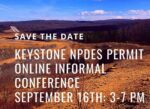- Share on Facebook
- Like
- Digg
- Tumblr
- VKontakte
- Buffer
- Love This
- Odnoklassniki
- Meneame
- Blogger
- Amazon
- Yahoo Mail
- Gmail
- AOL
- Newsvine
- HackerNews
- Evernote
- MySpace
- Mail.ru
- Viadeo
- Line
- Comments
- SMS
- Viber
- Telegram
- Subscribe
- Skype
- Facebook Messenger
- Kakao
- LiveJournal
- Yammer
- Edgar
- Fintel
- Mix
- Instapaper
- Copy Link
- Bluesky
By Karen Yarnell, WVEC Secretary
The Great American Outdoors Act (GAOA), S. 3422, was signed into law by the president on August 4, 2020. It contains components from two previously introduced bills, the Land and Water Conservation Fund (LWCF) and the Restore Our Parks Act. On June 17, 2020 the GAOA overwhelmingly passed the Senate by a vote of 73-25. The original sponsors were Senators Joe Manchin (D-WV) and Cory Gardner (R-CO). Over a month later, on July 22, this bipartisan legislation passed the House 310-107. Senator Shelley Moore Capito and all three WV Congressmen cosponsored the bill, but only our Senators and Rep. Carol Miller voted aye. Apparently, Rep. McKinley thought he was voting aye, but mistakenly voted no, according to his legislative aide. We have no information on why Rep. Mooney voted no. Trump tweeted on March 3 that he supported the bill, to help Cory Gardner (R-CO) and Steve Daines (R-MT) in their Senate reelection bids. Previously, Trump proposed slashing the LWCF by nearly 97%.
Senators Gardner, Daines, and Portman (R-OH) spoke at the signing ceremony, but no Democrats were invited. Only Senator Warner (D-VA) was mentioned. Secretary of Interior Bernhardt ironically credited Republicans with their primary role on conservation of American lands. Many Sierra Club activists and others in WV and across the nation have lobbied for many years to get the LWCF permanently authorized and fully funded. It is hard to overstate the importance of full funding for the LWCF in the Great American Outdoors Act.
In February 2019, Senator Joe Manchin, the ranking member of the Senate Energy and Natural Resources Committee and a longtime LWCF advocate, led the effort, with Lisa Murkowski (R-AK) and Maria Cantwell (D-WA), to permanently reauthorize the LWCF through the John D. Dingell, Jr. Conservation, Management, and Recreation Act (S. 47). WV Senator Shelley Moore Capito was a cosponsor. Since the LWCF was created in 1964, the same year as the Wilderness Act, only $19 billion have been appropriated, with $22 billion additional revenues being siphoned for non-conservation purposes. In fiscal year 2020, only $495 million was appropriated to the LWCF, not nearly full funding, but the highest amount in 15 years. The program was fully funded at $900 million only twice in its history. LWCF is funded primarily with revenues from offshore oil and gas royalty payments. The Great American Outdoors Act will now provide full funding every year. Every U.S. state and territory have benefited from the LWCF since it was established.
The LWCF provides funding for recreation and conservation projects on local, state, and federal public lands, including hunting and fishing access on wildlife management areas, preservation of historic buildings and battlefields, and buying inholdings, easements, and mineral rights on federal public lands. Since 1964, West Virginia has received $241 million for over 500 projects in 54 of 55 counties. $184 million in “direct federal acquisition” funds benefited these public lands in WV: Canaan Valley National Wildlife Refuge, Gauley River National Recreation Area, Harpers Ferry National Historic Park, Monongahela National Forest, New River Gorge National River, Ohio River Islands National Wildlife Refuge, and Spruce Knob-Seneca Rocks National Recreation Area. LWCF has protected 57,000 acres in the Gauley River and New River Gorge Recreation Area that include all public access points along the Lower and Middle Gauley River and over 2,000 named rock climbing routes, as well as what remains of 19th and 20th century mining towns in the New River Gorge. “State and local assistance” grants provide funds for local community parks and other public outdoor recreation facilities, like swimming pools, bike trails, golf courses, tennis courts, marinas, campgrounds, etc. Twenty-six WV State Parks together have received $8 million, for campgrounds, lodges, and recreation facilities.
The Great American Outdoors Act also establishes the National Parks and Public Land Legacy Restoration Fund which is funded through half of existing unobligated revenues the government receives from on and offshore energy development, up to $1.9 billion per year for the next five years for a total of up to $9.5 billion. There is a $20 billion maintenance backlog on our public lands – the National Park Service, U.S. Forest Service, U.S. Fish and Wildlife Service, Bureau of Land Management, and Bureau of Indian Education will all benefit. The Act provides funding to repair infrastructure like roads, trails, recreation sites, bridges, buildings, and water systems. According to Senator Manchin, funding deferred maintenance projects will create more than 110,000 infrastructure-related jobs. With the full funding of $900 million, the Land and Water Conservation Fund could support an additional 15,000 to 28,000 jobs each year.







Why did Mooney vote ‘no’ if he meant to vote ‘yes’? Because he does not know what he is doing.